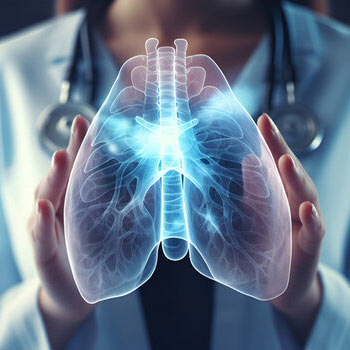Pulmonology
- Home
- Services
- Pulmonology
What is Pulmonology?
Pulmonology is a medical specialty focused on the diagnosis and treatment of diseases affecting the respiratory system, which includes the lungs, airways, and chest. Pulmonologists, or pulmonary disease specialists, are trained to manage complex respiratory conditions such as asthma, chronic obstructive pulmonary disease (COPD), interstitial lung disease, lung cancer, and sleep-related breathing disorders. This field plays a crucial role in ensuring respiratory health and improving the quality of life for individuals with breathing difficulties.
How Important is Pulmonology?
The respiratory system is vital for life, supplying oxygen to the body and removing carbon dioxide. When this system is compromised, it can significantly impact a person's overall health and well-being. Pulmonologists are essential in diagnosing, managing, and treating conditions that affect breathing. Their expertise is critical in both acute and chronic cases, from sudden severe asthma attacks to long-term management of COPD.

What types of respiratory conditions are typically addressed by pulmonologists?
Asthma
A chronic inflammatory disease of the airways that causes episodes of wheezing, shortness of breath, chest tightness, and coughing. Pulmonologists help in managing asthma through medication, lifestyle changes, and action plans to handle acute exacerbations.
Chronic Obstructive Pulmonary Disease (COPD)
A group of lung conditions, including emphysema and chronic bronchitis, that cause airflow obstruction and breathing difficulties. Treatment involves medications, pulmonary rehabilitation, and, in severe cases, oxygen therapy or surgery.
Lung Cancer
Pulmonologists are involved in the diagnosis and management of lung cancer, often working with oncologists to provide comprehensive care. Diagnostic tools like bronchoscopy, biopsy, and imaging studies are essential in detecting and staging lung cancer.
Interstitial Lung Disease
A group of disorders causing scarring of lung tissue, leading to stiffness and difficulty in breathing. Pulmonologists work to identify the underlying cause and provide treatments to manage symptoms and slow disease progression
Sleep Apnea
A condition characterized by repeated pauses in breathing during sleep, leading to poor sleep quality and other health issues. Pulmonologists use sleep studies to diagnose sleep apnea and recommend treatments such as CPAP (Continuous Positive Airway Pressure) therapy.
What diagnostic tools and techniques are essential in the field of pulmonology?
Spirometry
A common test used to assess how well the lungs work by measuring the amount and speed of air that can be inhaled and exhaled. It's crucial in diagnosing and monitoring conditions like asthma and COPD.
Bronchoscopy
A procedure that allows doctors to look inside the lungs' airways using a thin, flexible tube called a bronchoscope. It's used for diagnosing infections, lung diseases, and for taking tissue samples.
Imaging Studies
Chest X-rays, CT scans, and MRIs provide detailed images of the lungs and help in diagnosing various lung conditions, including tumors, infections, and interstitial lung diseases.
Lung Biopsy
A procedure to remove a small sample of lung tissue for examination under a microscope. It helps in diagnosing conditions like lung cancer, infections, and other lung diseases.
Arterial Blood Gas Analysis
This test measures the levels of oxygen and carbon dioxide in the blood, which helps in assessing how well the lungs are functioning in terms of gas exchange
What are the primary treatment approaches used in pulmonology?
Medications
These include bronchodilators, steroids, antibiotics, and other drugs to manage symptoms and treat underlying causes of respiratory conditions. Inhalers are commonly used for asthma and COPD to deliver medication directly to the lungs
Pulmonary Rehabilitation
A program that combines exercise, education, and support to help patients improve their physical conditioning and manage their symptoms effectively
Oxygen Therapy
Used for patients with severe respiratory conditions who have low blood oxygen levels. It involves supplying extra oxygen through a mask or nasal prongs to improve oxygen saturation in the blood.
Surgical Interventions
In certain cases, surgery may be necessary, such as lung volume reduction surgery for severe COPD or lung transplantation for end-stage lung disease.
Lifestyle Modifications
Smoking cessation, avoiding exposure to pollutants, and maintaining a healthy lifestyle are crucial for preventing and managing respiratory diseases
Why is preventive care crucial in pulmonology?
Preventive care is a vital aspect of pulmonology. It involves strategies and interventions aimed at reducing the risk of respiratory diseases. Some preventive measures include
- Vaccinations: Immunizations such as the flu vaccine and pneumococcal vaccine can help prevent infections that can lead to serious respiratory conditions
- Smoking Cessation Programs: Smoking is a major risk factor for many respiratory diseases. Programs that help individuals quit smoking are essential for lung health
- Environmental Controls: Reducing exposure to air pollutants, allergens, and occupational hazards can help prevent respiratory conditions
- Regular Health Check-ups: Routine medical exams and screenings can detect respiratory problems early, allowing for prompt treatment and better outcomes
When to See a Pulmonologist?
You should consider seeing a pulmonologist if you experience
- Chronic Cough: Lasting more than eight weeks
- Shortness of Breath: Especially if it’s new or getting worse
- Wheezing: A whistling sound when you breathe
- Chronic Mucus Production: Producing a lot of mucus, especially if it's thick, discolored, or has blood.
- Unexplained Weight Loss: Along with respiratory symptoms
Pulmonology is a vital medical specialty dedicated to ensuring the health and functionality of the respiratory system. Pulmonologists play an essential role in diagnosing, treating, and managing a wide range of respiratory conditions, from common ailments like asthma to life-threatening diseases like lung cancer. Through a combination of advanced diagnostic tools, innovative treatments, and preventive care, pulmonologists strive to improve the quality of life for their patients and address the growing burden of respiratory diseases worldwide. As the field continues to advance, ongoing research and collaboration will be crucial in overcoming the challenges and enhancing respiratory health outcomes.
